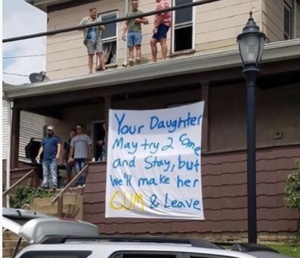Sexual Violence at Fraternity Parties
Overview
Fraternity houses are one of the only places where all university students are able to drink alcohol and socialize because of the strict policies enforced in university residences which prohibit the consumption of alcohol and occurrence of social events within its premises. As such, there exists a power imbalance in university campuses where students admire fraternities and most university recorded sexual violences occur at fraternity parties where a large population of students, both members and non-members, attend regularly. This environment explains why fraternity men compared to their counterparts allegedly have a higher tendency to exhibit sexually violent behaviour because of their higher status and hypermasculine environment[1].
University Campus Culture
University offers a unique setting where the student population consists of a wide range of class, race, and gender backgrounds. However, a post-secondary institution in itself is a class-privileged place. Historically, universities were elitist where the affluent, white individuals pursued additional education[2]. Today, a college degree is a privilege because of its sense of accomplishment. Students pay tuitions consisting of tens of thousands of dollars each year, in pursuit of better economic positions.
Similarly, the sense of autonomy experienced by university students encourage the discovery of a newer self. New students in universities are randomly placed into residences then urged to create new relationships and adapt to their unfamiliar environment. Thus, the majority of the university population conform to the prominent culture in post-secondary settings that involve excessive alcohol consumption and a "hook-up culture", and all individuals are pressured to participate[3]. The "hook-up culture" that is normative in universities "involves various types of spontaneous sexual activity with an emphasis on a convenient, short, no-strings attached encounter"[4]. This increases the number of sexual violences because there is an opportunity for perpetrators to victim blame. The accused individuals use alcohol to "deflect meaning, responsibility, and recollection of events" and assume the sex culture as automatic consent[5].
Fraternities
Fraternities are similar to universities in that they are a smaller group of a student population within a bigger post-secondary institution. Additionally, fraternities have their own governing bodies making the organizations autonomous much like universities. Essentially, apart from the basic societal laws, fraternities are its own separate entity. However, what is specific to fraternities is its exclusivity. For instance, only males are eligible to become members of a fraternity and if admitted, individuals have to persist through trials in order to become a full-fledged member[6]. Furthermore, even amongst the fraternity structure there is a divide between races. White fraternities continue to be predominant in the United States because of its history for being white, male organizations where "a group of like-minded gentlemen could share their thoughts freely"[7]. This racial division amongst the fraternities creates hierarchies where specific groups of individuals are marginalized. Thus, fraternities are another division of the privileged, white, and male population within an already advantaged group of university students[8].

John Enochs Case
John Enochs[9] is a white, affluent, male fraternity member at Indiana University who was accused of raping two female students. He was convicted to a more lenient sentence and spent one day in jail. In one of the cases, he admitted to "rude touching" and was seen "naked on top of her" by two of the victims' friends[10]. However, because of the alcohol consumption involved in the cases, the cases were concluded to be insufficient to prove the guilt of Enochs. However, many individuals question whether it was the Enochs' social status which allowed him to escape with minimal punishments for his inappropriate actions[11].
Hegemonic Masculinity in the Greek System
The Greek system is patriarchal in its institutional structure. It is made up of male fraternities and female sororities and within the Greek system itself, only fraternities are able to host social events in their houses which increase the number of sexual violences as women have to find a way back home[12]. There are strict bylaws which prevent sororities from living a similar social lifestyle to fraternities. This creates a power inequality as fraternities have a monopoly over the social events which take place within the Greek system and increases the social pressure for sorority women to be likeable by fraternity members[13]. The social pressure experienced by sororities are identical to the power inequality observed by other students as fraternity members are seen as the elite class of individuals because of their selective membership process and their superior capacity to host social events where other student groups do not have the resources to compete[14]. The sexual promiscuity in university culture and the hegemonic masculinity present permits fraternity parties to sexualize women increasing the likelihood of sexual violence. The perception of fraternity parties in the media supports this belief. For instance, the film, "Neighbours", portrays fraternity parties as scandalous and filled with drunk, hypersexual individuals.


Notable Alumni
The fraternity culture reveres dominant male figures. Fraternities advertise their organizations through their prominent members who have very strong economic positions within society. This idea of a better economic position and the belief that past successors have exhibited masculine behaviour as top echelons of society further underscores the historical patriarchal beliefs. For instance, "Greek organizations count as alumni 39 current Senators, 19 US Presidents, and nearly one-third of all US Supreme Court Justices, and half of the Top 10 Fortune 500 CEOs"[15]. As such there exists a deep-rooted support to be hypermasculine.
Causes of Sexual Violence at Fraternity Parties
There are multiple factors which cause sexual violence at fraternity parties. One factor is the university culture which promotes excessive drinking and normalizes a "hook-up culture." Secondly, the monopoly that fraternities have on social events presents opportunities for sexual violence. Lastly, the patriarchal and exclusive institutional structure of the Greek system establishes an environment where the white, affluent, and male population are the norm. These social identities and systems of oppression create an environment where sexual violence at fraternity parties become acceptable.
References
- ↑ Boyle, K. (2015). Social Psychological Processes that Facilitate Sexual Assault within the Fraternity Party Subculture. Sociology Compass, 9(5), 386-399. Retrieved from http://onlinelibrary.wiley.com.ezproxy.library.ubc.ca/doi/10.1111/soc4.12261/full
- ↑ Horsman, M. & Cormack, P. (2016). A Meaningful Meaninglessness: Canadian University Culture as Gendered and Class-based Privilege. Gender and Education, 30(1), 119-133. https://doi-org.ezproxy.library.ubc.ca/10.1080/09540253.2016.1170764
- ↑ Boyle, K. (2015). Social Psychological Processes that Facilitate Sexual Assault within the Fraternity Party Subculture. Sociology Compass, 9(5), 386-399. Retrieved from http://onlinelibrary.wiley.com.ezproxy.library.ubc.ca/doi/10.1111/soc4.12261/full
- ↑ Horsman, M. & Cormack, P. (2016). A Meaningful Meaninglessness: Canadian University Culture as Gendered and Class-based Privilege. Gender and Education, 30(1), 119-133. https://doi-org.ezproxy.library.ubc.ca/10.1080/09540253.2016.1170764
- ↑ Horsman, M. & Cormack, P. (2016). A Meaningful Meaninglessness: Canadian University Culture as Gendered and Class-based Privilege. Gender and Education, 30(1), 119-133. https://doi-org.ezproxy.library.ubc.ca/10.1080/09540253.2016.1170764
- ↑ Anderson, E. (2007). Inclusive Masculinity in a Fraternal Setting. Men and Masculinities, 10(5), 604-620. Retrieved from http://journals.sagepub.com/doi/abs/10.1177/1097184X06291907
- ↑ Worthern, M. (2011). Fraternities. Barnett, G. (Ed.) Encyclopedia of Social Networks. http://dx.doi.org.ezproxy.library.ubc.ca/10.4135/9781412994170.n120
- ↑ Ray, R. & Rosow, J. (2012). The Two Different Worlds of Black and White Fraternity Men:Visibility and Accountability as Mechanism of Privilege. Journal of Contemporary Ethnography, 41(1), 66-94. Retrieved from http://journals.sagepub.com/doi/full/10.1177/0891241611431700
- ↑ Brennan, C. (2016, June 26). Indiana University Frat Member Avoids Prison in Rape Cases, Sentenced Instead to One-year Probation. Daily News. Retrieved from http://www.nydailynews.com/news/national/indiana-student-accused-raping-women-probation-article-1.2687426
- ↑ Jorgensen, S., Crane, R., & Grinberg E. (2016, June 28). Prosecutors Drop Rape Charges Against Former Indiana University Student in Plea Deal. CNN Retrieved from http://www.cnn.com/2016/06/28/us/indiana-university-rape-case-plea-deal/index.html
- ↑ Styles, Ruth. (2016, July 1). EXCLUSIVE: Grinning on His Country Club Golf Course - the Frat Boy Who Escape Two Rape Charges With Just One Day in Prison Relishes the Freedom Which Has Left His 'Victims' Furious. Daily Mail. Retrieved from http://www.dailymail.co.uk/news/article-3668907/Grinning-plays-golf-frat-boy-attacker-spent-just-ONE-DAY-prison-despite-accused-TWO-rapes.html
- ↑ Jozkowski, K. & Wiersma-Mosley, J. (2017). The Greek System: How Gender Inequality and Class Privilege Perpetuate Rape Culture. Family Relations, 66(1), 89-103. Retrieved from http://onlinelibrary.wiley.com/doi/10.1111/fare.12229/abstract
- ↑ Jozkowski, K. & Wiersma-Mosley, J. (2017). The Greek System: How Gender Inequality and Class Privilege Perpetuate Rape Culture. Family Relations, 66(1), 89-103. Retrieved from http://onlinelibrary.wiley.com/doi/10.1111/fare.12229/abstract
- ↑ Jozkowski, K. & Wiersma-Mosley, J. (2017). The Greek System: How Gender Inequality and Class Privilege Perpetuate Rape Culture. Family Relations, 66(1), 89-103. Retrieved from http://onlinelibrary.wiley.com/doi/10.1111/fare.12229/abstract
- ↑ Walker, J., Martin, N., & Hussey, A. (2014). Greek Organization Membership and Collegiate Outcomes at an Elite, Private University. Research in Higher Education, 56(3), 203-227. Retrieved from https://link.springer.com/article/10.1007%2Fs11162-014-9345-8